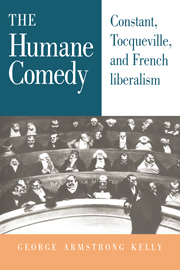1 - PORTS IN THE STORM
Published online by Cambridge University Press: 31 March 2010
Summary
LIBERTY: LAST PORT OF GALL
To be liberal, Aristotle wrote, is “to give the right people the right amount, at the right time.” While that pre-modern definition could be stretched to fit early-nineteenth-century French liberalism – and the Aristotelian mean invoked in support of its juste milieu – the immortal soul of this doctrine is elsewhere. It is best described as “putting liberty first.” The liberals were not entirely agreed on the sources or forms of liberty, or on its errand; but they were persuaded that it was sacred air – especially for connoisseurs with fine lungs. For some, this liberty was “natural,” for others it was “useful”; for still others, “it is a privilege of noble minds which God has fitted to receive it, and it inspires them with a generous fervor.” Above all, it was defined, to a large degree, by what menaced it, by alternative priorities of value, notably Throne and Altar and the populist Republic (hyperbolically labelled “tyranny” and “anarchy” on occasion by liberal publicists).
Most can agree that liberalism – sometimes audacious under Bonaparte (at least from the distance of Coppet), pert and challenging under Charles X – failed in the July Monarchy, with lasting effects on the French body politic. Whether this was the great failure of an inspired political theory or the unlamentable and petty failure of social closure and social greed remains arguable. The propaganda of the last century has done much to make the second thesis carry weight. Yet much of this liberal spirit of long ago is neither insufferably “bourgeois” nor untimely today.
- Type
- Chapter
- Information
- The Humane ComedyConstant, Tocqueville, and French Liberalism, pp. 1 - 38Publisher: Cambridge University PressPrint publication year: 1992



